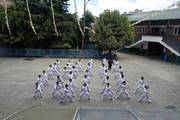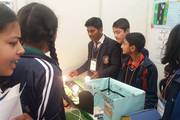
LRI School
The Learning Realm International (LRI) Secondary School is an English-medium co-educational institution, which operates as a residential-cum-day school and is registered as a TRUST. It was founded on February 24, 1988 A.D. (Falgun 12, 2044 B.S.) in Kalankisthan, Kathmandu by Shiv Raj Pant, who worked tirelessly to establish it. The school is authorized by the Government of Nepal to offer classes up to Grade 12.
The school embodies a pursuit of academic excellence in Nepal, utilizing the finest educational methodologies to redefine international standards and prepare students for global citizenship. The L.R.I. ethos encourages students to explore their individuality and distinctiveness by embracing the rich educational legacy of the institution.
At the heart of Learning Realm International Secondary School's vision and mission is the goal of nurturing children who can lead and thrive in a constantly evolving global community. The school places great emphasis on developing both intelligence quotient (IQ) and emotional quotient (EQ) in successive generations, with the aim of creating well-rounded individuals.
It imparts context-friendly value-based education from Pre-school to Secondary levels. The school is pioneered by a team of promising educators pursuing the following goals through quality education.
Goals:
- To provide 'world-class education' to become a proactive globalized citizen
- To offer a stimulated environs for the inherent talents get explored for holistic development
- To develop competent human capital capable of carving out their own special 'space' at national and international levels
- To transform each pupil to be a noble citizen imbibing universal human culture for a healthy social life
- To empower every student rise beyond the average level of performance and 'strive for excellence'
SPONSORED SCHOOLS
GALLERY
















Salient Features
UMESH SHRESTHA AUDITORIUM
This is an ultra-modern hall for variety of purposes, such as holding of cultural programs, major competitions, conference, etc.
STUDENT PARLIAMENT
It is uniquely cherished platform to develop students leading think-tanks, policymakers, diplomats, bureaucrats, and key members in state governance as well as in regional and global UN Agencies. It also facilitates academic lecture/ discourse/ presentation, etc.
MULTIPURPOSE GROUND
It has a beautiful children’s play area outside Tiny Tots block. It renders the following additional utilities as well:-
- For assemblies
- As a playground accommodating Basketball and mini-football area
- For smaller functions
- For Fete celebration etc
VOLLEYBALL AND BADMINTON COURTS
They serve the purpose of usual game practice every day.
L.B. CHAND MEDIA-N-RESOURCE CENTER
It houses a variety of literature on different subjects, useful for the reference purpose of both – teachers and taught. It also has hundreds of books for the entertainment and leisure reading of children. For the information update, English and Nepali newspapers are made available.
PETER GOLDMAN-MARTHA KONGSGAARD ‘ICT LAB’
This computer lab is a unique part of the learning environment of school and has a state-of-the-art ambiance.
SCIENCE LABORATORIES
LRI School has three full-fledged spacious and modern Laboratories for the practicals of Physics, Chemistry, and Biology subjects.
AMBER GURUNG MUSIC CONSERVATORY
LRI School has a modern and well equipped hall for receiving training in vocal and instrumentation.
EATERY
LRI School Canteen serves a variety of tasteful and hygienic eatables, snacks and pack-contained juices etc. at fixed prices on the working day during tiffin intervals. The menu includes pre-packed outside-made things as well as instantly prepared canteen things.
STATIONERY
The course books, exercise books, certain other stationery items, School Diary, School Calendar, Tie, Belt, Badge and House uniform etc. are made available for purchases here.
MEALS IN THE HOSTEL FOR DAY SCHOLARS
The day scholars willing to have their lunch, tea etc. in the hostel are allowed to do so on payment of the prescribed charges.
DAY BOARDER SCHEME
This scheme provides a student the same facilities as of a boarder except stay at night, at proportionately lesser charges.
TRANSPORTATION
LRI School provides bus for desirous students to-and-from School. The intended bus stop must, however, fall on the fixed routes. The buses pick up the bus-rider students from their respective stops in the morning and drop them off at the same stops in the evening according to a fixed Time-Table that is notified before commencement of a new academic session.
Admission Guidelines
In order to become a new member of LRI family, a student must secure a merit position in the written test followed by an oral (if deemed necessary). This entrance exam comprises of the questions from English, Nepali, Mathematics, and general subjects. The admission decision by the School inter alia depends upon the vacancies available.
The applications of school transfer, however, must accompany the following documents:-
- Grade-Sheet or Marks-Sheet of the school/exam last attended
- Transfer Certificate by the previous school (Birth Certificate for the preschoolers)
- Medical Fitness Certificate
Fee Guidelines
- The tuition fee is to be paid for twelve calendar months.
- School/ Hostel fees are required to be paid every month else late fee is liable to be charged in the next month's bill.
- If fees for three consecutive months are unpaid, a student may be required to be re-registered by her/his parents.
- The fees/charges, prescribed by the school for different purposes, are subject to revision anytime if the compulsions so demand.
- No concession or reduction in fees is granted on account of any short or long absence of a student from School.
- A residential school, present in the Hostel for any potion of a month, is charged for the whole month.
- Fees once paid, including the annual charges deposited in the beginning of the academic year, are not refunded.
- A student leaving the School during the continuity of an academic session must pay tuition fees for the whole year, without which no Transfer Certificate is issued.
- No student can join a new academic session of the School if any amount of dues of the preceding academic years remains unpaid.
- The charge for Transfer Certificate or Recommendation letter is collected separately.
SYSTEM OF EVALUATION
The promotion of a student to the higher class, next year, is decided under Continuous Assessment System (CAS) that includes the following:-
- First Term ExamSecond Term Exam
- Third Term Exam
- One Unit Test each during every term.
In addition to the above, class work, homework, and attendance also form the basis of evaluation for final promotion. The final academic result is a Grade-Sheet that mentions Grade Point Average (GPA), as determined below by Government of Nepal:-
|
SN. |
INTERVAL IN % |
GRADE |
DESCRIPTION |
GRADE POINT |
|
1 |
90 to 100 |
A+ |
Outstanding |
4.0 |
|
2 |
80 to below 90 |
A |
Excellent |
3.6 |
|
3 |
70 to below 80 |
B+ |
Very good |
3.2 |
|
4 |
60 to below 70 |
B |
Good |
2.8 |
|
5 |
50 to below 60 |
C+ |
Above average |
2.4 |
|
6 |
40 to below 50 |
C |
Average |
2.0 |
|
7 |
20 to below 40 |
D |
Below average |
1.6 |
|
8 |
1 to below 20 |
E |
Insufficient |
0.8 |
|
9 |
0 |
N |
Not graded |
0.0 |
SCHOLARSHIP INFORMATION
L.R. Ratna
It is the most prestigious award among all the prizes given away by School, and is presented in the form of a Gold Medal along with a ‘Certificate of Excellence’ to such students of Grade Ten who perform extra-ordinarily well in the S.L.C. exam by securing a position in the Board merit list.
The best all-rounder student
It includes a specially designed memento along with a 'Letter of Merit' to such student who is judged as the best in studies, games and co-curricular activities during the year.
The best disciplined student
Under this category, different memento and 'Certificate of Appreciation ' are awarded to the student judged the best, discipline-wise, during the year.
Grade Toppers
The students, who secure the first rank in different Grades from LKG to Nine, at the end of the academic year, are motivated with a Gold Medal and a 'Commendation Letter' each. The students getting the second position and the third position are also provided distinct incentives.
Scholarships
The school is conscious of its social responsibility and moral duty towards the potential students whose family background is financially unsound. Furthermore, school also knows about the approach it should have towards the children/wards of such parents/guardian whose help and contribution remains unforgettable in the development of School.
In such cases, a total number of 10% of the pupils is considered for grant of either free-ship or half-free ship for one academic year, which is reviewed every year based on the academic performance of students concerned as well as the financial capacity of School.
Schools Like LRI School
Academics and Students
| Grade | Number of Students |
|---|---|
| Early Childhood Development | 56 |
| 1 | 140 |
| 2 | 138 |
| 3 | 120 |
| 4 | 124 |
| 5 | 156 |
| 6 | 244 |
| 7 | 245 |
| 8 | 274 |
| 9 | 310 |
| 10 | 298 |
| 12 | 238 |
| Total Students | 2343 |
Source: 2081 IEMIS Report, CEHRD Data outdated or incorrect? Click to claim school and update the data.
Nearby Schools
Do you work for LRI School?
Claim your profile and keep your school's data up-to-date and get insights on user interests on your school.
Claim Your School Now- Private
- National Examinations Board
- Established 2044 B.S. (1988 A.D.
- 01-5218188, 01-5218515 ,01-5218170, 01-5219703
You May Also Consider

- Banshidhar Marg, Kathmandu

- Lazimpat, Kathmandu

- Sanobharyang, Nagarjun, Kathmandu

- Gyaneshwor, Kathmandu


